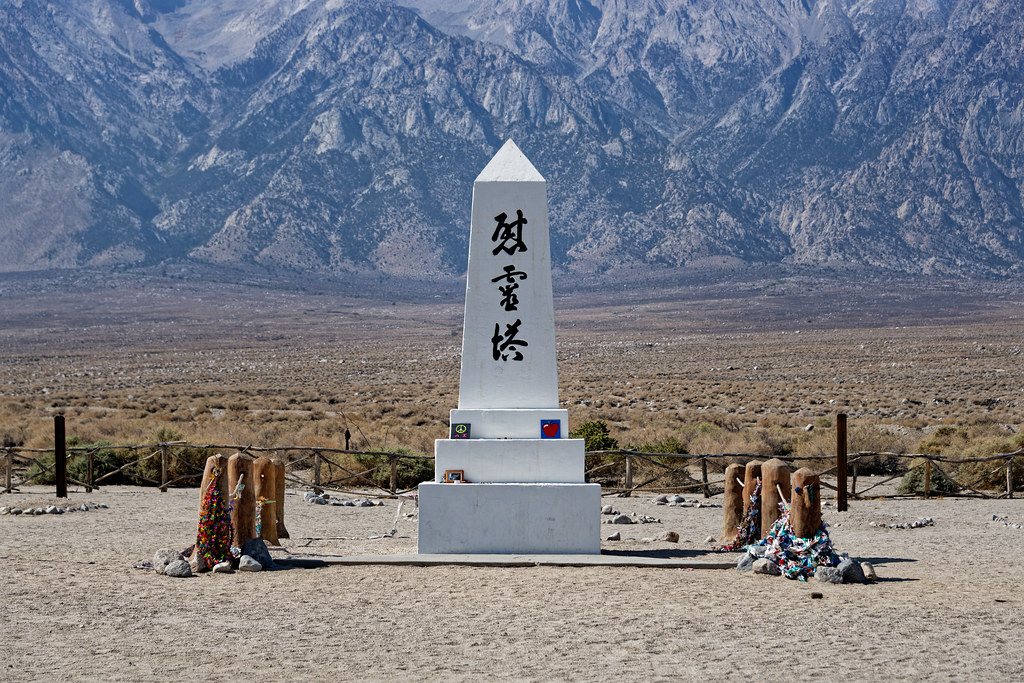#Japanese American incarceration
Text

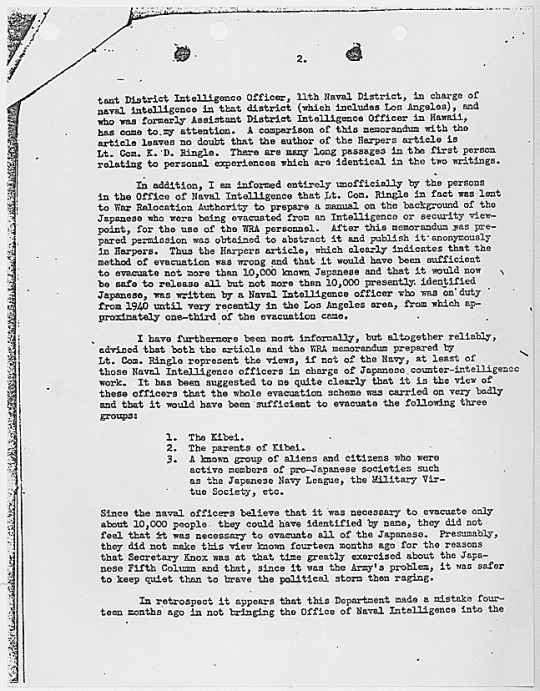

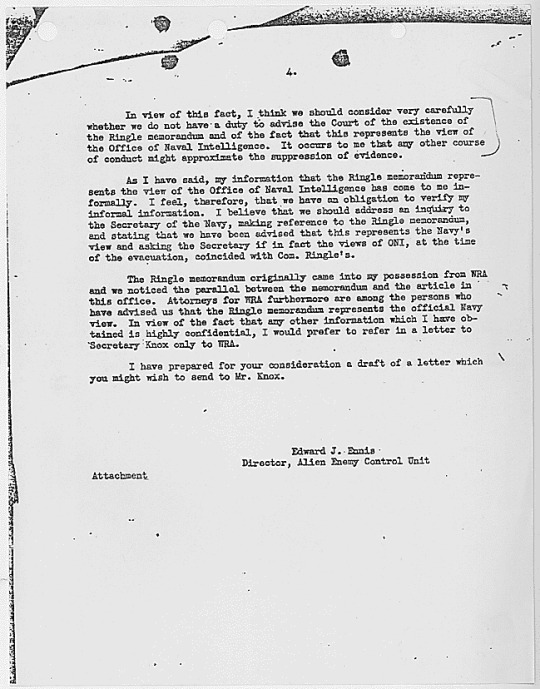
At the beginning of WWII, Naval Intelligence officers concluded that there were around 10,000 Japanese Americans who could pose a threat to the U.S.
Army General DeWitt used his authority to incarcerate 120,000.
U.S. v Korematsu, Exhibit Q, April 30, 1943.
Record Group 21: Records of District Courts of the United States
Series: Criminal Case Files
File Unit: United States v. Korematsu
Transcription:
Edward J. Ennis
Director
Exhibit Q
Department of Justice
Alien Enemy Control Unit
Washington
April 30, 1943
[stamp] DEPARTMENT OF [illegible]
SEP 1[illegible] 1951
DIVISION OF [illegible]
ATTORNEY GENERAL [end stamp]
MEMORANDUM FOR THE SOLICITOR GENERAL
RE: Japanese Brief
Last week with our draft of the [underlined] Hirabayeshi [end underlined] brief I transmitted to Mr. Raum somematerial which I thought he would find helpful in obtaining a background view of the context of this case. In particular, I sent him a copy of Harpers Magazine for October 1942, which contains an article entitled [underlined] The Japanese in America, The Problem and the Solution, [end underline] which is said to be by "An Intelligence Officer". without attempting to summarize this article, it stated among other things that:
1. The number of Japanese aliens and citizens who would act as saboteurs and enemy agents was less than 3,500 throughout the entire United States.
2. Of the Japanese aliens, "the large majority are at least passively loyal to the United States".
3. "The Americanization of Nisei (American-born Japanese) is far advanced."
4. With the exception of a few identified persons who were prominent in pro-Japanese organization the only important group of dangerous Japanese were the Kibei (American-born Japanese predominantly educated in Japan).
5. "The identity of Kibei can be readily ascertained from United States Government records."
6. "Had this war not come along at this time, in another ten or fifteen years there would have been no Japanese problem, for the Issei would have passed on, and the Nisei taken their place naturally in American communities and national life."
This article concludes: "To sum up: The 'Japanese Problem' has been magnified out of its true proportion largely because of the physical characteristics of the Japanese people. It should not be handled on the basis of the [underlined: individual], regardless of citizenship and [underlined: not] on a racial basis." (Emphasis in original.)
I thought this article interesting even though it was substantially anonymous. I now attach much more significance to it because a memorandum prepared by Lt. Con. X. D. Ringle, who has until very recently been Assis-
[handwritten in bottom right corner] #8 [end handwritten]
[page 2]
tant District Intelligence Officer, 1th Naval District, in charge of naval intelligence in that district (which includes Los Angeles), and who was formerly Assistant District Intelligence Officer in Hawaii, has come to my attention. A comparison of this memorandum with the article leaves no doubt that the author of the Harpers article is Lt. Com. K. D. Ringle. There are many long passages in the first person relating to personal experiences which are identical in the two writings.
In addition I am informed entirely unofficially by the persons in the Office of Naval Intelligence that Lt. Com. Ringle in fact was lent to War Relocation Authority to prepare a manual on the background of the Japanese who were being evacuated from an Intelligence or security viewpoint, for the use of the WRA personnel. After this memorandum was prepared permission was obtained to abstract it and publish it anonymously in Harpers. Thus the Harpers article, which clearly indicates that the method of evacuation was wrong and that it would have been sufficient to evacuate not more than 10,000 know Japanese and that it would now be sage to release all but not more than 10,000 presently identified Japanese, was written by a Naval Intelligence officer who was on duty from 1940 until very recently in the Los Angeles area, from which approximately one-third of the evacuation came.
I have furthermore been most informally, but altogether reliably, advised that both the article and the WRA memorandum prepared by Lt. Com. Ringle represent the views, if not of the Navy, at least of those Naval Intelligence officers in charge of Japanese counter-intelligence work. It has been suggested to me quite clearly that it is the view of these officers that the whole evacuation scheme was carried out badly and that it would have been sufficient to evacuate the following three groups:
1. The Kibei.
2. The parents of Kibei.
3. A known group of aliens and citizens who were active members of pro-Japanese societies such as the Japanese Navy League, the Military Virtue Society, etc.
Since the naval officers believe that it was necessary to evacuate only about 10,000 people they could have identified by name, they did not feel that it was necessary to evacuate all of the Japanese. Presumably, they did not make this view known fourteen months ago for the reasons that Secretary Knox was at that time greatly exercised about the Japanese Fifth Column and that, since it was the Army's problem, it was safer to keep quiet than to brave the political storm then raging.
In retrospect it appears that this Department made a mistake fourteen months ago in not bringing the Office of Naval Intelligence into the
[page 3]
controversy. I suppose that the reason that it did not occur to any of us to do this was the extreme position then taken by the Secretary of the Navy.
To have done so would have been wholly reasonable, since by the terms of the so-called delimitation agreement it was agreed that Naval Intelligence should specialize on the Japanese, while Army Intelligence occupied other fields. I have not seen the document, but I have repeatedly been told that Army, before the war, agreed in writing to permit the Navy to conduct its Japanese intelligence work for it. I think it follows, therefore, that to a very considerable extent the Army, in acting upon the opinion of Intelligence officers, is bound by the opinion of the Naval officers in Japanese matters. Thus, had we known that the Navy thought that 90% of the evacuation was unnecessary, we could strongly have urged upon Gen. DeWitt that he could not base a military judgment to the contrary upon Intelligence reports, as he now claims to do.
Lt. Com. Ringle's full memorandum is somewhat more complete than the version published in Harpers and I think you will be interested in reading it. In the past year I have looked at great numbers of reports, memoranda, and articles on the Japanese, and it is my opinion that this is the most reasonable and objective discussion of the security problem presented by the presence of the Japanese minority. In view of the inherent reasonableness of this memorandum and in view of the fact that we now know that it represents the view of the Intelligence agency having the most direct responsibility for investigating the Japanese from the security viewpoint, I feel that we should be extremely careful in taking any position on the facts more hostile to the Japanese than the position of Lt. Com. Ringle. I attach the Department's only copy of this memorandum.
Furthermore, in view of the fact that the Department of Justice is now representing the Army in the Supreme Court of the United States and is arguing that a partial, selective evacuation was impracticable, we must consider most carefully what our obligation to the Court is in view of the fact that the responsible Intelligence agency regarded a selective evacuation as not only sufficient but preferable. It is my opinion that certainly one of the most difficult questions in the whole case is raised by the fact that the Army did not evacuate people after any hearing or on any individual determination of dangerousness, but evacuated the entire racial group. The briefs filed by appellants in the Ninth Circuit particularly pressed the point that no individual consideration was given, and I regard it as certain that this point will be stressed even more, assuming that competent counsel represent appellants, in the Supreme Court. Thus, in one of the crucial points of the case the Government is forced to argue that individual, selective evacuation would have been impractical and insufficient when we have positive knowledge that the only Intelligence agency responsible for advising Gen. DeWitt gave him advice directly to the contrary.
[page 4[
In view of this fact, I think we should consider very carefully whether we do not have a duty to advise the Court of the existence of the Ringle memorandum and of the fact that this represents the view of the Office of Naval Intelligence. It occurs to me that any other course of conduct might approximate the suppression of evidence.
As I have said, my information that the Ringle memorandum represents the view of the Office of Naval Intelligence has come to me informally. I feel, therefore, that we have an obligation to verify my informal information. I believer that we should address an inquiry to the Secretary of the Navy, making reference to the Ringle memorandum, and stating that we have been advised that this represents the Navy's view and asking the Secretary if in fact the views of ONI, at the time of the evacuation, coincided with Com. Ringle's.
The Ringle memorandum originally came into my possession from WRA and we noticed the parallel between the memorandum and the article in this office. Attorneys for WRA furthermore are among the persons who have advised us that the Ringle memorandum represents the official Navy view. In view of the fact that any other information which I have obtained is highly confidential, I would prefer to refer in a letter to Secretary Knox only to WRA.
I have prepared for your consideration a draft of a letter which you might wish to send to Mr. Knox.
Edward J. Ennis
Director, Alien Enemy Control Unit
Attachment
#archivesgov#April 30#1943#World War II#WWII#Japanese American incarceration#Japanese internment#Asian American history#Japanese American history#US v Korematsu
63 notes
·
View notes
Video
Manzanar Cemetery Monument by Mark Stevens
Via Flickr:
While taking in views of the landscape present in the Manzanar National Historic Site with a view looking to the southwest. This is of the Manzanar Cemetery and monument with a mountain backdrop of Mount Williamson.
#Alabama Hills#Alabama Hills National Scenic Area#Azimuth 246#Blue Skies#California and Oregon Road Trip#Concentration Camp#Day 2#Desert#Desert Landscape#Desert Mountain Landscape#Desert Plant Life#DxO PhotoLab 5 Edited#Hillsides#Internment Camp#Japanese American Incarceration#Japanese Internment Camp#Landscape#Landscape - Scenery#Looking SW#Manzanar#Manzanar Cemetery#Manzanar Cemetery Monument#Manzanar National Historic Site#Monument#Monument at Manzanar Cemetery#Mount Whitney Group#Mount Williamson#Mountain Peak#Mountains#Mountains in Distance
2 notes
·
View notes
Text
George Takei has a book! And it's his birthday!

Crown Books for Young Readers via NPR
Speaking on Weekend Edition Saturday's broadcast this morning, Takei and illustrator Michelle Lee discuss what it was like to be forced into a camp at age 4, and the details looked for to properly show life behind the wire.
"'The horse stalls were pungent,' Takei remembers, 'overwhelming with the stench of horse manure. The air was full of flies, buzzing. My mother, I remember, kept mumbling "So humiliating. So humiliating."'
He says, 'Michelle's drawing really captured the degradation our family was reduced to.'"
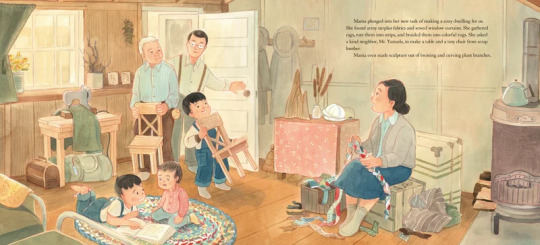
"You drew the home that my mother made out of that raw space, Takei tells Lee. "That was wonderful."
"'These themes of displacement and uprooting of communities from one place to another — these are things that are constantly happening,' says Lee. 'Because of war and because of political decisions ... those themes aren't uncommon. They're universal.'"
Full story with audio button (so you can listen to Takei and Lee talk about the project!) produced by Samantha Balaban. Includes link to order the book.
Happy birthday Mr. Takei.
#george takei#george takei's birthday!#michelle lee#books#human rights#japanese-american incarceration WWII
9 notes
·
View notes
Text
OK So Context
I kind of progressively lost my mind in college. What with the learning about the specifics of what is going on and how it relates to what has happened in the past. -and subsequently took the time to develop a series of presentations about why the US sucks.
Specifically, the interventions in Latin American, just the astoundingly predatory nature of American Capitalism domestically and The Police, like, as a concept.
Fast forward to the Summer of 2022 and I realized that working with an editor and publishing a book is hard and expensive but its measured in thousands not tens of thousands so I committed to doing that at some point in my life with this project, and began working on adapting the presentations with more research and more connections between these different expressions of White Supremacy.
I let the research balloon. There's just so much.
Anyway, the whole social media campaign thing was to distract me from pinning all that down. -and last month one of the members of my subreddit, u/acebush1, self immolated in the time it took to get around to responding to his most recent comment. That made this all very real. The US' support for Israel and it's foundation as a settler colonial state are critically relevant.
Right, so,. Last month someone asked me how to buy the book and that was the thing I had said to myself would mark the transition back to a writing and research focus rather than just research and learning social media.
Site is up. Its an email submission form with a set your own price stripe link.
#US Authoritarianism Project#Aaron Bushnell#US Politics#protest#writeblr#History#Colonialism#Imperialism#Police#Duopoly#Democracy#republicans#American Fascism#american exceptionalism#Slavery#Jim Crow#Segregation#Mass Incarceration#reservation#deportation#forced migration#sterilization#eugenics#ethnic cleansing#dred scott#japanese internment#guantanamo#trail of tears#US Authoritarianism#Anarchy
7 notes
·
View notes
Text
I was today years old when I learned that Canada also incarcerated Japanese immigrants and Japanese Canadians during World War II.
I knew America had concentration camps for people of Japanese ancestry, but I had never been told by anyone that Canada did too. I only figured it out now because the Wikipedia article on the American camps had a link to the page on Canada's.
Seems like something that should be talked about more often. I hate how America centric even our world history classes are.
#history#american history#canadian history#canadian#japanese history#japanese#japan#canada#american#america#usa#us history#usa history#japanese american#japanese canadian#concentration camp#japanese internment#internment camp#japanese incarceration#mass incarceration#world history#ww2 history#ww2#wwii#wwii history#world war 2#world war ii#wwii era
6 notes
·
View notes
Photo

Read in 2021:
We Are Not Free by Traci Chee
“All around me, my friends are talking, joking, laughing. Outside is the camp, the barbed wire, the guard towers, the city, the country that hates us. We are not free. But we are not alone.”
#litedit#we are not free#traci chee#yalitedit#ownvoices books#diverse books#young adult literature#historical fiction#ya historical fiction#literature#book aesthetic#1940s#japanese american#books#my edit#mystuff#books2021#read in 2021#the center photo is at manzanar (one of the many incarceration camps) and the bottom right is the 'going for broke' nisei regiment
20 notes
·
View notes
Text
hm i think that we kinda glossed over internment camps in school and that's pretty criminal actually
#i feel like the holocaust was hammered into our heads (which is a good thing! learning about that is a good thing!)#and then we kinda spend like one lesson on the mass incarceration of japanese americans based on xenophobia commited by our own country#and uh.#hm I wonder what the reason for that is#rue rants
1 note
·
View note
Text
Scholastic Books to Maggie Tokuda-Hall – Delete Racism References…
Another Wow…!! Silencing authors… Another company attempting to. Again…
Is this really how we want to continue presenting America to the world…? A country of racists who want to continue down the path of belittling other races? Putting the ‘less desirables’ behind the curtain and to keep quiet…???
Publisher Scholasatic Books asked Maggie Tokuda-Hall to remove all of the Racism references…
View On WordPress
#incarceration camp#internment camps#Japanese-American#Love in the Library#Maggie Tokuda-Hall#publisher#Rosa Parks#Scholasatic Books#Studies Weekly#wwii
1 note
·
View note
Text

Carl Mydans Young Japanese-American Man Incarcerated at a Relocation Camp, Tule Lake, CA 1944
112 notes
·
View notes
Text

Ten cars of evacuees of Japanese ancestry are now aboard and the doors are closed
Evacuees are bound for Merced Assembly Center, CA. (Incarceration of Japanese Americans in U.S. concentration camps during WWII)
Dorothea Lange, 1942
72 notes
·
View notes
Photo



On August 10, 1988, the Civil Liberties Act of 1988 was passed into law, apologizing and making reparations for the incarceration of Japanese Americans during WWII.
Record Group 11: General Records of the United States Government
Series: Enrolled Acts and Resolutions of Congress
File Unit: Laws of the United States; Public Law 100-383: An Act to Implement Recommendations of the Commission on Wartime Relocation and Internment of Civilians
Transcription:
Public Law 100-383
H.R. 442
One Hundredth Congress of the United States of America
At the Second Session
Begun and held at the City of Washington on Monday, the twenty-fifth day of January,
one thousand nine hundred and eighty eight.
An Act
To implement recommendations of the Commission on Wartime Relocation and Internment of Civilians
Be it enacted by the Senate and House of Representatives of the United States of America in Congress assembled.
Section 1. Purposes.
The purposes of this Act are to--
(1) acknowledge the fundamental injustice of the evacuation, relocation , and internment of United States citizens and permanent resident aliens of Japanese ancestry during World War II;
(2) apologize on behalf of the people of the United States for the evacuation, relocation, and internment of such citizens and permanent resident aliens;
(3) provide for a public education fund to finance efforts to inform the public about the internment of such individuals so as to prevent the recurrence of any similar event;
(4) make restitution to those individuals of Japanese ancestry who were interned;
(5) make restitution to Aleut residents of the Pribilof Islands and the Aleutian Islands west of Unimak Island, in settlement of United States obligations in equality and at law, for--
(A) injustices suffered and unreasonable hardships endured while those Aleut residents were under United States control during World War II;
(B) personal property taken or destroyed by United States forces during World War II;
(C) community property, including community church property, taken or destroyed by United States forces during World War II; and
(D) traditional village lands on Attu Island not rehabilitated after World War II for Aleut occupation or other productive use;
(6) discourage the occurrence of similar injustices and violations of civil liberties in the future; and
(7) make more credible and sincere any declaration of concern by the United States over violations of human rights committed by other nations.
SEC.2. Statement of the Congress
(a) With regard to individuals of Japanese Ancestry.-- The Congress recognizes that, as described by the Commission on Wartime Relocation and Internment of Civilians, a grave injustice was done to both citizens and permanent resident aliens of Japanese ancestry by the evacuation, relocation, and internment of civilians during World War II. As the Commission documents, these actions were carried out without adequate security reasons and without any acts of espionage or sabotage documented by the Commission, and were motivated largely by racial prejudice, wartime hysteria, and a
[page 2]
H.R.442--2
failure of political leadership. The excluded individuals of Japanese ancestry suffered enormous damages, both material and intangible, and there were incalculable losses in education and job training, all of which resulted in significant human suffering for which appropriate compensation has not been made. For these fundamental violations of the basic civil liberties and constitutional rights of these individuals of Japanese ancestry, the Congress apologizes on behalf of the Nation.
(b) With respect to the Aleuts.--The Congress recognizes that, as described by the Commission on Wartime Relocation and Internment of Civilians, the Aleut civilian residents of the Pribilof Islands and the Aleutian Islands west of Unimak Island were relocated during World War II to temporary camps in isolated regions of southeast Alaska where they remained, under United States control and in the care of the United States, until long after any potential danger to their home villages had passed. The United States failed to provide reasonable care for the Aleuts, and this resulted in widespread illness, disease, and death among the residents of the camps; and the United States further failed to protect Aleut personal and community property while such property was in its possession or under its control. The United States has not compensated the Aleuts adequately for the conversion or destruction of personal property, and the conversion or destruction of community property caused by the United States military occupation of Aleut villages during World War II. There is no remedy for injustices suffered by the Aleuts during World War II except and Act of Congress providing appropriate compensation for those losses which are attributed to the conduct of United States forces and other officials and employees of the United States.
TITLE I--UNITED STATES CITIZENS OF JAPANESE ANCESTRY AND RESIDENT JAPANESE ALIENS
SEC 101.SHORT TITLE.
This title may be cited as the "Civil Liberties Act of 1988".
SEC 102. REMEDIES WITH RESPECT TO CRIMINAL CONVICTIONS
(a) Review of Convictions.-- The Attorney General is requested to review any case in which an individual living on the date of the enactment of this Act was, while a United States citizen or permanent resident alien of Japanese ancestry, convicted of a violation of--
(1) Executive Order Numbered 9066, dated February 19, 1942;
(2) the Act entitled "An Act to provide penalty for violation of restrictions or orders with respect to persons entering, remaining in, leaving, or committing any act in military areas or zones", approved March 21, 1942 (56 Stat. 173); or
(3) any other Executive order, Presidential proclamation, law of the United States, directive of the Armed Forces of the United States, or other action taken by or on behalf of the United States or its agents, representatives, officers, or employees, respecting the evacuation, relocation, or internment of individuals solely on the basis of Japanese ancestry;
[page 3]
H.R.442--14
estate of a parcel of land consisting of all land outside such village that is within 660 feet of any point on the boundary of such village. The conveyance may be made under the authority contained in section 14(h)(1) of the Alaska Native Claims Settlement Act (Public Law 92-203;43 U.S.C. 1613(h)(1)), except that after the enactment of this Act, no site on Attu Island, Alaska, other than such traditional Aleut village site and such parcel of land, may be conveyed to the Corporation under such section 12(h)(1).
(f) Authorization of Appropriations.-- There are authorized to be appropriated $15,000,000 to the Secretary to carry out this section.
SEC.208. COMPLIANCE WITH BUDGET ACT.
No authority under this title to enter into contracts or to make payments shall be effective in any fiscal year except to such extent and in such amounts as are provided in advance in appropriations Acts. In any fiscal year, the Secretary, with respect to--
(1) the Fund established under section 203,
(2) the trust established under section 205(b), and
(3) the provisions of section 206 and 207,
shall limit the total benefits conferred to an amount not in excess of the appropriations for such fiscal year. Any provision of this title which, directly or indirectly, authorizes the enactment of new budget authority shall be effective only for fiscal year 1989 and thereafter.
SEC.209.SEVERABILITY.
If any provision of this title, or the application of such provision to any person or circumstance, is held invalid, the remainder of this title and the application of such provision to other persons not similarly situated or to other circumstances shall not be affected by such invalidation.
TITLE III-TERRITORY OR PROPERTY CLAIMS AGAINST UNITED STATES
SEC.301. EXCLUSION OF CLAIMS
Notwithstanding any other provision of law or of this Act, nothing in this Act shall be construed as recognition of any claim of Mexico or any other country or any Indian tribe (except as expressly provided in this Act with respect to the Aleut tribe of Alaska) to any territory or other property of the United States, nor shall this act be construed as providing any basis for compensation in connection with any such claim.
[signature] Norman Mineta
Speaker of the House of Representatives.
Speaker pro tempore
[signature] Spark Matsunaga
["Vice President of the United States and" crossed out] Acting President of the Senate. Pro Tempore.
[stamped] APPROVED
AUG 10 1988
[signature] Ronald Reagan
#archivesgov#August 10#1988#1980s#Japanese American history#Japanese American incarceration#World War II#WWII#reparations#Ronald Reagan
41 notes
·
View notes
Video
Respectfully Approaching History (Manzanar National Historic Site) by Mark Stevens
Via Flickr:
While taking in views of the landscape present in the Manzanar National Historic Site with a view looking to the southwest. This is of the Manzanar Cemetery and monument with a mountain backdrop of Mount Williamson.
#Alabama Hills#Alabama Hills National Scenic Area#Azimuth 245#Blue Skies#California and Oregon Road Trip#Concentration Camp#Day 2#Desert#Desert Landscape#Desert Mountain Landscape#Desert Plant Life#DxO PhotoLab 5 Edited#Hillsides#Internment Camp#Japanese American Incarceration#Japanese Internment Camp#Landscape#Landscape - Scenery#Looking SW#Manzanar#Manzanar Cemetery#Manzanar Cemetery Monument#Manzanar National Historic Site#Monument#Monument at Manzanar Cemetery#Mount Whitney Group#Mount Williamson#Mountain Peak#Mountains#Mountains in Distance
3 notes
·
View notes
Photo

My father, Susumu Yamashita, was a junior executive at the San Francisco branch of Mitsubishi trading company before the December 7, 1941 Japanese attack at Pearl Harbor. On April 30, 1942, he was involved in the mass forced removal of the Japanese American community from Berkeley to Tanforan detention center, a former race track in San Bruno, with my mother, Kiyoko Yamashita, and my 18 month-old sister Kimiko. My family was housed in a horse-stall “apartment” from May to September. When my family was transported to the Topaz, Utah incarceration camp in September 1942, my father was assigned to be the liaison to the Issei (first-generation) residents due to his Japanese-language proficiency, which was gained from his 11 years of education in Tokyo between 1911–1922. This is why he was labeled as a “Kibei,” American born but educated in Japan. After working 14 months in Community Welfare, providing the camp’s social services, my father was ready for a change. My Cal Berkeley/Harvard Business School-alumnus, ex-businessman father asked to be transferred to the agricultural division to work as a ranch hand. He achieved personal satisfaction from working outdoors as a Kibei cowboy, tanned and healthy, herding cattle astride his favorite horse, Red. At age 39, he was undoubtedly one of the oldest “cowboys” amongst the riders at the Topaz cattle ranch. In 1951 he rejoined Mitsubishi and was charged with establishing its New York headquarters as the new Mitsubishi International Corporation. After Topaz, my father never rode a horse again.
Michael Yamashita
#Susumu Yamashita#western riding#Utah#Topaz War Relocation Center#Central Utah Relocation Center (Topaz)#world war II#WWII#Michael Yamashita
170 notes
·
View notes
Note
I’m sure you (or the original poster) didn’t mean anything by it, but the picture for “christians keep moving: this is a heathen neighborhood” was originally this image
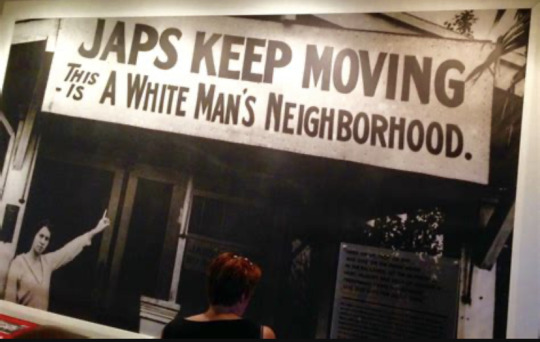
It’s from the WWII incarceration of Japanese Americans, and it’s really unfortunate to see people using this image without understanding the racist history behind it.
Holy shit that's appalling. I had no idea, and I appreciate the additional context.
652 notes
·
View notes
Text
.

Today, Jan. 30 California celebrates Fred Korematsu Day of Civil Liberties and the Constitution. Where does Fred Korematsu come in? Mr. Korematsu was an American civil rights activist who stood up to the U.S. government’s wrongful incarceration of over 120,000 people of Japanese ancestry living on the West Coast during World War II. Even without support from his family or community, he disobeyed the government’s orders, and as a result, spent over two years in various prisons and wartime incarceration sites. His case went to the Supreme Court, and in 1944, the Court ruled against him, claiming the mass incarceration was a “military necessity.” Nearly 40 years later, the government finally issued apologies and reparations to the camp survivors who remained, and in 1998 President Bill Clinton awarded Mr. Korematsu the Presidential Medal of Freedom, the highest civilian award in the United States.
In the same year (1998), California also launched the California Civil Liberties Public Education Program. The program, managed by the California State Library, funds projects that educate the public about civil liberties injustices carried out based on an individual or group’s race, national origin, immigration status, religion, gender, or sexual orientation (including, but not limited to, the internment of Japanese Americans during World War II). Over 400 projects have been funded since the program’s birth, including video and audio broadcasts, books, graphic novels, photo collections and exhibits, museum displays, arts performances, material preservation, educational guides, websites, public art and monuments, and more. To learn more about the program, visit library.ca.gov/grants/civil-liberties.
67 notes
·
View notes
Text
this is kind of a spitball but does anyone remember learning about the Japanese internment camps in WW2 and how all American-born Japanese citizens, including children and infants, were kept there on suspicion of being spies in the war? how “anyone with a drop of Japanese blood” qualified for incarceration? and everyone naturally responded to this with “how can a child or baby be a spy?” “how does being slightly Japanese make you a spy?” and everyone could so easily see the unfairness of that, but now with the case of Palestinian children and infants and American-Palestinian citizens, I have seen grown adults claim that the carpet bombings and air strikes and shootings and stabbings are all somehow fair, justified, deserved, etc. because they “grow up to be terrorists,” and it’s “Allah’s punishment for their sins.” that tiny little children “brought it on themselves” because god forbid a resistance group resists genocide.
we could see the unfairness then, enough for a fucking formal apology to be issued for it, but why can’t we see it now? is it because now it’s brown people facing unfair treatment and hatred and you can’t put them into your homogenous circle of whiteness like the Japanese? the words may be different, but dehumanizing language never changes. propaganda never changes, and neither does the American capacity for cognitive dissonance apparently.
#cal.txt#palestine#free palestine#gaza#end the genocide#ww2 history#japanese internment#dehumanizing language#like ….. did we really just not learn anything at all#idk
44 notes
·
View notes
